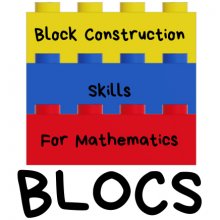
Block Construction Skills for Mathematics (BLOCS)
BLOCS stands for Block Construction Skills for Mathematics. We are a group of researchers from the University of Surrey and Loughborough University working together to determine how LEGO® is related to and can be used to improve maths achievement in 7- to 9-year-olds. This research is funded by The Leverhulme Trust.
Contact us: e.farran@surrey.ac.uk
Overview
It is hard to think of an everyday activity that doesn’t involve the use of spatial skills. Whether we’re reading a map or packing a suitcase, we need to understand the location and dimensions of objects and their relationships to one other. Spatial ability varies across children, and predicts adult expertise in Science, Technology, Engineering and Mathematics (STEM). This is unsurprising, given the many examples of spatial skills that are integral to STEM professions (for example understanding graphs and diagrams). Recent research has found that it is possible to train spatial skills, and that this in turn can improve achievement in STEM subjects.
We are a group of researchers who are working together to determine how LEGO® is related to and can be used to improve maths achievement in seven to nine year-olds. Lego is not only a practical choice, but research has shown that it has the capacity to help children reach their mathematical potential. We are also interested in exploring how digital technologies (a part of many children’s everyday activities) can improve spatial abilities. Specifically, we will identify how both physical Lego and digital Lego construction activities can be used to improve spatial abilities and measure the impact that this has on maths ability. Across these research studies, we take an Open Science / Open Research approach (to learn more about this approach: https://www.surrey.ac.uk/library/open-research). Each study has been pre-registered or will be published as a registered report, and our study materials and data will be made openly available following publication of the studies.
This series of research studies, funded by the Leverhulme Trust, is supported by evidence from our group and from others that: children who perform well on spatial tasks show strong maths abilities; similar brain areas are used to process spatial and number tasks; and maths relies heavily on spatial constructs (for example spatial relations, number lines, measurements, and quantitative magnitudes).
Stay connected
Latest tweets
@cog_dev_lab



Sustainable Development Goal
This project contributes to the United Nations Sustainable Development Goal of Quality Education.





